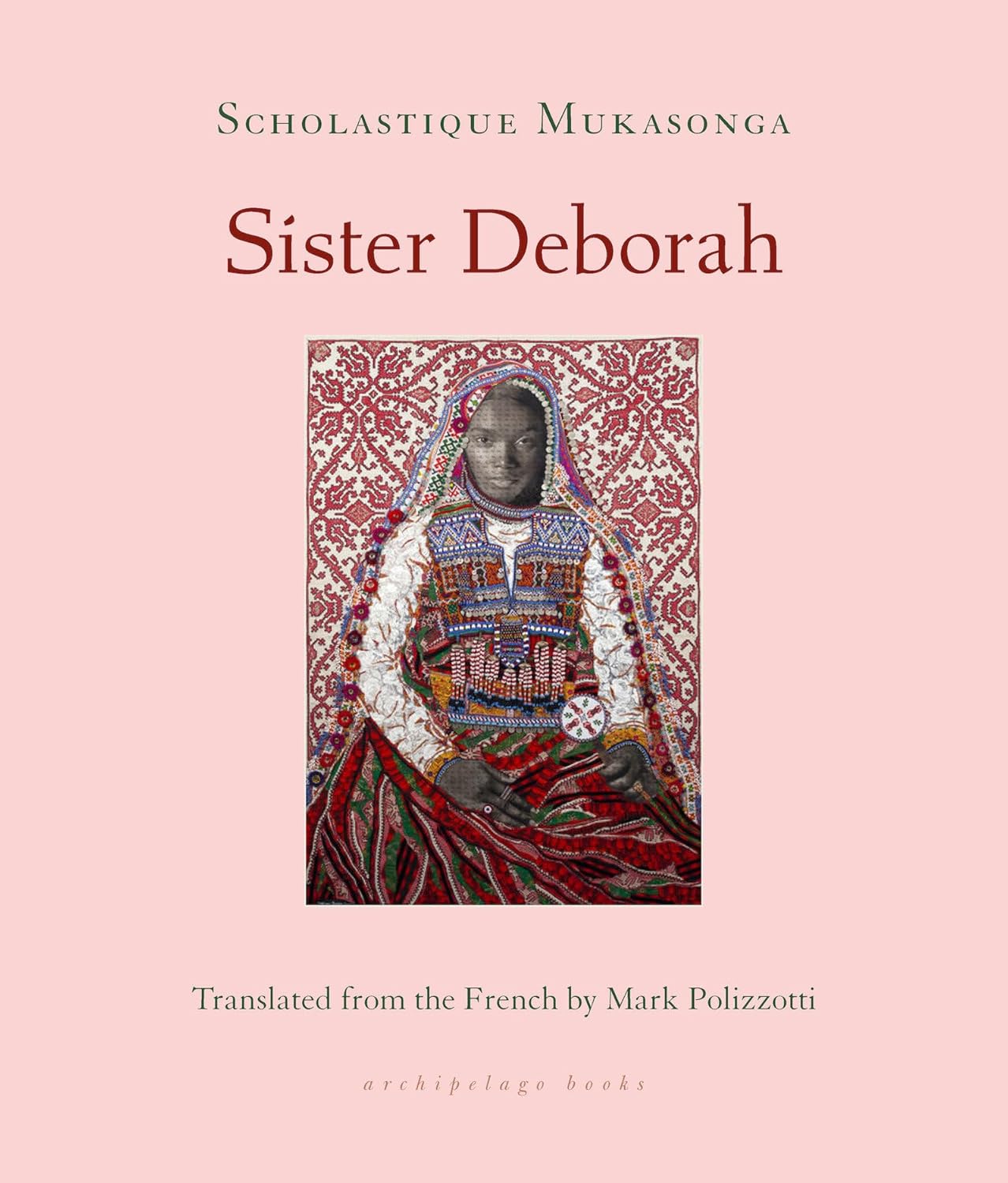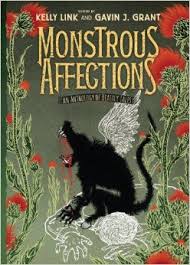Sister Deborah
- By Scholastique Mukasonga; translated by Mark Polizzotti
- Archipelago
- 135 pp.
- Reviewed by Bárbara Mujica
- October 30, 2024
A graceful, humorous tale about the pursuits of a mythical prophetess in East Africa.

In the 1930s, Rwanda, then under Belgian rule, received a host of Christian missionaries, whites from Europe and Blacks from the United States. With the permission of the Rwandan chief, the Americans, under the leadership of Father Marcus, established a temple on a previously forbidden hillside. There, they celebrated services that melded seamlessly with the deep-rooted practices of the native population. “In contrast to the deathly quiet of the old missionaries’ church,” writes Scholastique Mukasonga in her new novel, “they went wild with transports of joy: clapping hands, beating drums, blowing trumpets, making a dreadful racket.”
Most astounding of all was that the dance was led by a woman, who, “with her eyes bulging from their sockets and long strings of drool trickling from her mouth,” gave long speeches in an unfamiliar language. They called her Sister Deborah, and in the congregation, she held the rank of prophetess.
Father Marcus preached the coming of the Black messiah, but Sister Deborah clarified that it would be a woman. She would come on a cloud from which she would drop a seed, imbuto, that would produce a harvest so abundant that everyone would have enough to eat. Rwandan women, who had been toiling in the fields to cultivate beans, sweet potatoes, and cassava — foods originally from the Americas that require a great deal of work to grow — would no longer have to break their backs.
Perched on a termite mound under a coral tree, Sister Deborah attracted an ever-growing group of female devotees. The women turned to her for advice and brought her their children to bless. She cured the ill with the touch of her hands or her cane.
Sister Deborah envisioned a matriarchal society in which women would no longer be subservient to men. She encouraged her followers to abandon the fields and disobey their husbands. Fed up with the injustices to which they were subjected and inspired by the prophetess, the women eventually went on a rampage, uprooting coffee plants, setting fire to huts, and harassing authorities, including an agronomist and the tax collector. Meanwhile, the men looked on, stupefied and helpless.
At first, the Belgian administrators were puzzled by the chaos. Then they learned of anti-colonialist cults spreading north from South Africa. “According to the specialists,” writes Mukasonga, these cults had been imported from Harlem (New York) and Jamaica, “where, judging from some magazine photos of their outfits and hairstyles, former slaves had regressed to a savage state.” Furthermore, “they preached an explosive mix of apocalyptic baptism, voodoo possession rituals, and African animist sorcery.” Some of the colonizers thought the cults were controlled by an international secret society with “octopoid tenacles” that extended from Moscow to other areas, with the primary target being Africa.
The Belgians wondered how “such a pathogen” had infected Rwanda, and naturally, their investigations led them to Sister Deborah. They knew they must confront the anarchy with violence. During a fierce assault, they murdered her.
Or did they?
Myths spread that she was killed and then resurrected. Some said her spirit went back to America because her African ancestors wanted nothing more to do with her. Ikirezi, a chronically ill Rwandan girl whom Sister Deborah had once restored to health, now lives in Washington, DC, where, under the name Deborah Jewels, she is an eminent Africanist teaching at Howard University. But who is she really? Ikirezi wonders:
“I begin to suspect that some unknown mysterious power emanating from the hands and cane of Sister Deborah, instead of my intellectual capabilities, has led me down a path that until now was forbidden to black women.”
When Reverend Marcus singles her out as the one whom the spirit of Sister Deborah has sent to find the path to Black liberation, she returns to Africa in his company. Back in Rwanda, Ikirezi learns of the Palace of the Queen of Women, whose ruler, known as She-Who-Must-Be-Obeyed, cured illnesses, cast out evil spells, and protected women and children using only her touch and her staff. When the queen died, she left the staff planted in the ground. As in the Arthurian legend, only her legitimate successor can pull it out.
Is Ikirezi that queen? Does the American Miss Jewels really carry the spirit of Sister Deborah within her? According to a prediction, “It is a black woman who will come to free the black people.” Perhaps it is Ikirezi who will extricate the buried staff and lead the pending revolution — or perhaps not.
Sister Deborah is a larger-than-life character who incorporates both native African and Christian traditions, and her vision of a female-centered world is at once thrilling and unsettling. Her call to action will undoubtedly speak to women of diverse cultures and backgrounds, but author Mukasonga is no utopist. She imbues her narrative with a heavy dose of reality and cynicism. We have not yet reached nirvana.
At times howlingly funny, Sister Deborah pokes fun at European colonialist powers and at the same time exposes the tragedy of occupation. Mukasonga also draws on Rwanda’s rich folk traditions without minimizing the injustices entrenched in its autochthonous culture.
Especially interesting is the interconnectedness — as well as the disparities — she highlights between African and African American customs, beliefs, anxieties, and political aspirations. By moving her story back and forth between Africa and the U.S., Mukasonga creates a lush mosaic of “blackness” — one that inspires and instructs in this wonderful read.
Bárbara Mujica is a novelist, essayist, short-story writer, and critic. Her latest novel, Miss del Río, based on the life of Mexican movie star Dolores del Río, was named one of the best books of 2022 by Library Journal and one of the five best recent historical novels by the Washington Post. Mujica’s novel Frida, based on the tumultuous relationship between Frida Kahlo and Diego Rivera, was an international bestseller published in 18 languages. Sister Teresa, based on the life of the Spanish saint Teresa de Avila, was adapted for the stage by the Actors Studio in Los Angeles. Her novel I Am Venus revolves around the identity of the mysterious model for the Rokeby Venus, the only extant female nude by Spanish painter Diego Velázquez. Mujica’s story collections are Imagining Iraq, an Amazon bestseller, Far from My Mother’s Home, and Sanchez across the Street. Her Collateral Damage: Women Write about War is a compendium of writings on the trauma of war. Mujica has won numerous prizes for her writing, including the E.L. Doctorow International Fiction Competition, the Pangolin Prize, and the Pioneer Prize from Dialogue on Diversity. She is a two-time Pushcart nominee. She is also a professor emerita at Georgetown University who specializes in early modern Spain and is the author of numerous books and articles on Spanish theater, mysticism, the counterreformation, and women’s writing. In 2022, her book Women Religious and Epistolary Exchange in the Carmelite Reform won the GEMELA Prize for best book of the year on early modern Hispanic women. Her English translation of Vicente Rodríguez’s nearly 1,000-page tome, Saint John of the Cross: A Biography, is due out early next year.

